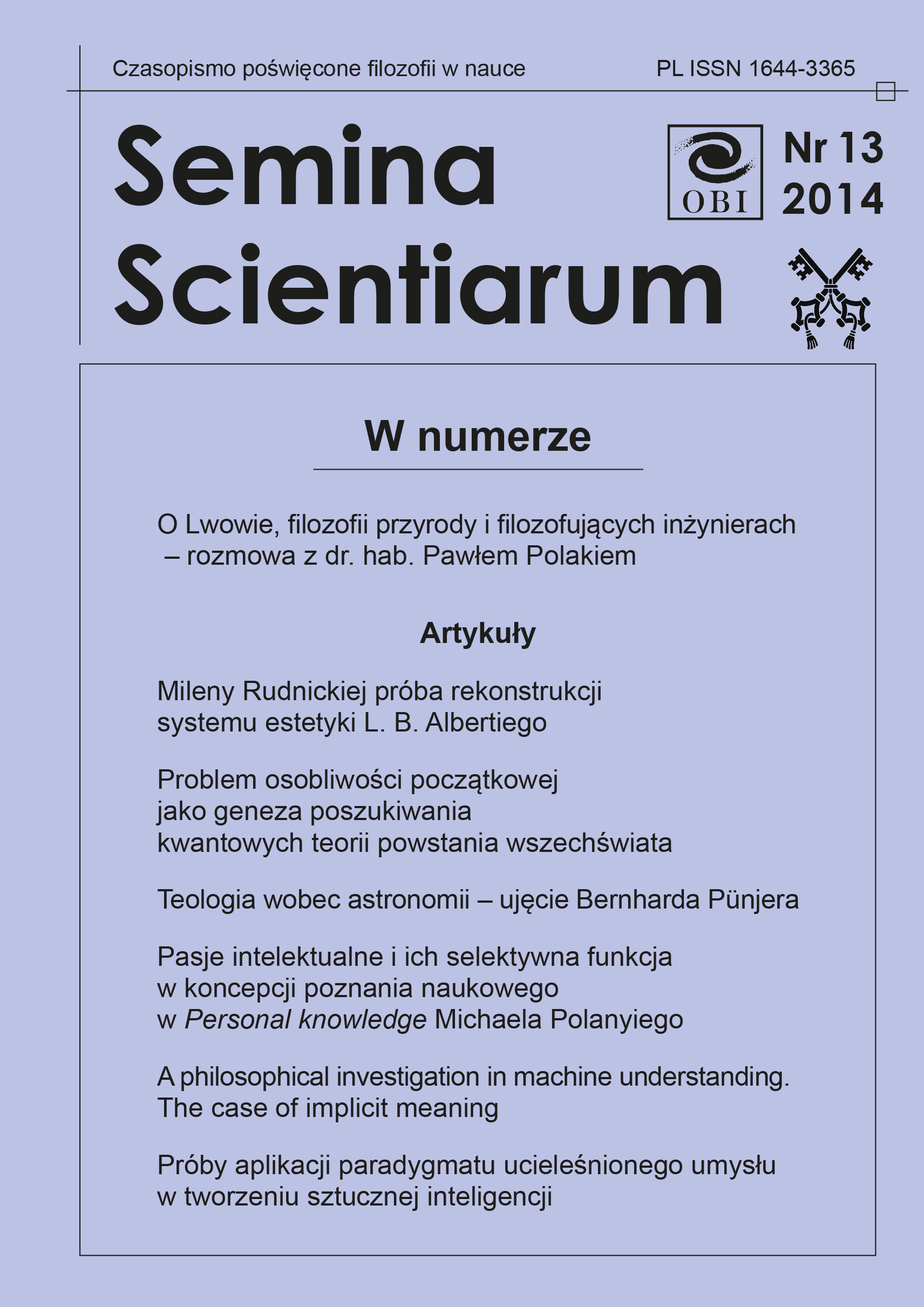About Relationships Between Mathematics and Philosophy on the Example of Archipelago of Mathematics Project
DOI:
https://doi.org/10.15633/ss.706Keywords:
philosophy, mathematics, virtual world of mathematics, computing, infinityAbstract
Some new, philosophically inspired, methods of teaching mathematics are discussed in this paper. These methods are implemented and embedded in the virtual environment of learning and exploring mathematics, called officially Archipelago of Mathematics (available at www.archipelagmatematyki.pl). They seem to be effective due to different interconnections between mathematics and philosophy (both historical and contemporary).
After describing methodological assumptions, goals, methods and the structure of Archipelago, I present two, designed by me, examples of its contents: (1) quasi-internet chat with the ghost of G.W. Leibniz (on metaphysics, philosophical aspects of calculus, and artificial intelligence); and (2) radio-style interview with a farmer on the mathematical theory of sets and infinity. Presented materials show such a relationships between mathematics and philosophy like: philosophical origin of some mathematical concepts, philosophical implications of some math. ideas and theorems, heuristic function of philosophical discussions in mathematics.
References
Archipelag Matematyki (http://www.archipelagmatematyki.pl), multimedialne środowisko nauczania i poznawania matematyki.
Cafe Aleph (http://blog.marciszewski.eu/), akademicki blog dyskusyjny W. Marciszewskiego i P. Stacewicza, zawierający sporo materiałów z pogranicza matematyki i filozofii.
Davis P. J., Hersch R., Świat matematyki, Warszawa 1994.
Kordos M., Wykłady z historii matematyki, Warszawa 1994.
Mała encyklopedia logiki, red. W. Marciszewski, Wrocław 1988.
Marciszewski W., „Mathesis Universalis” na nasze czasy. Wkład Fregego, Cantora i Gödla, „Zagadnienia Naukoznawstwa” 2011, nr 4 (190), s. 139–152.
Marciszewski W., Stacewicz P., Umysł – Komputer – Świat. O zagadce umysłu z informatycznego punktu widzenia, Warszawa 2011.
Murawski R., Filozofia matematyki. Zarys dziejów, Warszawa 1995.
Peter R., Gra z nieskończonością, Warszawa 1962.
Rasiowa H., Wstęp do matematyki współczesnej, Warszawa 1984.
Smullyan R., Szatan, Cantor i nieskończoność, Warszawa 2005.
Tatarkiewicz W., Historia filozofii, t. 1–3, Warszawa 1990.
Trzęsicki K., Leibnizjańskie inspiracje informatyki, „Filozofia Nauki” 2006, nr 3 (55), s. 21–48.
Downloads
Published
Issue
Section
License
Twórca oświadcza, że przysługują mu prawa autorskie do utworu i że nie są ograniczone w zakresie objętym niniejszym oświadczeniem oraz że utwór jest dziełem oryginalnym i nie narusza praw autorskich innych osób.
Twórca zezwala Uniwersytetowi Papieskiemu Jana Pawła II w Krakowie na nieodpłatne, niewyłączne i nieograniczone w czasie korzystanie z utworu, to jest:
- utrwalanie i zwielokrotnianie: wytwarzanie egzemplarzy utworu techniką drukarską, reprograficzną, zapisu magnetycznego oraz techniką cyfrową;
- obrotu oryginałem albo egzemplarzami, na których utwór utrwalono (wprowadzanie do obrotu, użyczenie lub najem oryginału albo egzemplarzy, publiczne wystawienie, wyświetlenie, a także publiczne udostępnianie utworu w taki sposób, aby każdy mógł mieć do niego dostęp w miejscu i w czasie przez siebie wybranym);
- włączenie utworu w skład utworu zbiorowego;
- udzielanie przez Uniwersytet Papieski Jana Pawła II w Krakowie sublicencji Creative Commons Uznanie autorstwa-Użycie niekomercyjne-Bez utworów zależnych 3.0 Polska
Uniwersytet Papieski Jana Pawła II w Krakowie udostępnia utwór na Platformie Czasopism należącej do uczelni, na licencji Creative Commons Uznanie autorstwa-Użycie niekomercyjne-Bez utworów zależnych 3.0 Polska. Tym samym uprawnia wszystkich zainteresowanych do korzystania z utworu pod następującymi warunkami:
- zostanie podany autor i tytuł utworu,
- zostanie podane miejsce publikacji (tytuł czasopisma i adres internetowy do oryginalnie opublikowanego utworu),
- utwór będzie dystrybuowany w sposób niekomercyjny,
- nie będą tworzone utwory zależne.

